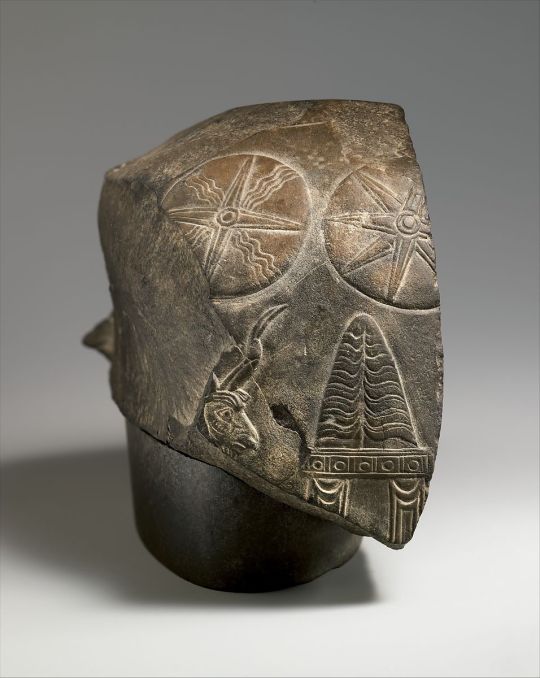Don't wanna be here? Send us removal request.
Photo


Top fragment of a kudurru with a mushhushshu dragon and divine symbols ca. 1156–1025 B.C.
Known as kudurrus or narus, a distinctive group of Babylonian stone monuments were once thought to be boundary markers placed in fields. In fact they are more likely to have been placed in temples, where their contents were preserved and sanctified. The monuments, often made from polished black limestone, are usually uneven and boulder-like in shape. They carry inscriptions describing grants of land, often from the king to a high official. Around the text are placed divine symbols, which act to protect and guarantee the gift. Kudurrus first appear in the second millennium B.C., during the period of Kassite rule in Babylonia. This fragmentary example dates to the 12th century B.C. The surviving piece, which comes from the top part of the kudurru, shows part of the body of a snake coiling round the upper surface. Below the snake is a mushhushshu, a composite dragon associated with Babylon’s chief deity, Marduk, and his son Nabu. The mushhushshu faces a temple façade or altar on which stands a spade symbol, also associated with Marduk. Below these can be seen a very small section of the original inscription. The other side of the stone shows astral symbols representing the sun (the sun-god Shamash) and Venus (the goddess Ishtar), as well as another stylized temple-façade, this time with a horned crown (a symbol used for the sky-god Anu and the great wind god Enlil). Also visible is part of a goat-fish, associated with the god Ea.
Period: Second Dynasty of Isin
Date: ca. 1156–1025 B.C.
Geography: Mesopotamia
Medium: Limestone
Dimensions: H. 6 ½ x W. 4 x D. 7 ¼ in. (16.5 x 10 x 18.4 cm)
27 notes
·
View notes
Photo




West of Sterling, Colorado, 2013.
Redwood City, California, 2013.
Redwood City, California, 2013.
Death Valley, California, 2013.
1 note
·
View note
Photo

Roger Ballen
source: chazen.wisc.edu
3 notes
·
View notes
Photo

Folded I Marloes ten Bhömer
The material for this shoe has been folded once and makes this abstract shoe shape. In the inside of this shoe, is a slipper detail hidden, which makes the shoe wearable.
http://www.virtualshoemuseum.com/marloes-ten-bhömer/
0 notes
Photo


0 notes
Photo

0 notes
Photo


Floors, Duomo, Siena
0 notes
Photo

La Reine Margot (1994)
Rest in Peace Patrice Chereau
21 notes
·
View notes
Photo

Henry Pu Yi, the last emperor of China.
12 notes
·
View notes
Photo

Feiyi Wen
Animism
0 notes
Audio
Dance of the Dream Man (Instrumental) by Angelo Badalamenti
shared from exfm
0 notes
Photo
Salvador Dali

9 notes
·
View notes
Photo

Einsteinturm by Erich Mendelsohn
17 notes
·
View notes

